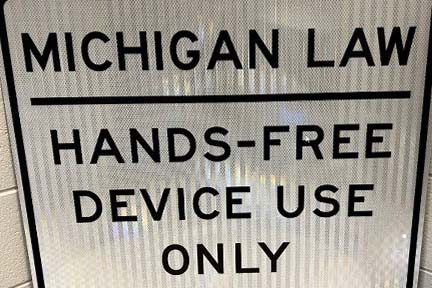
MDOT installs Hands-Free Device Use signs
|

|

|
|||||||||||||||||
|
|||||||||||||||||
News Digest – Week of June 26, 2023
Old Glory flies against a brilliant blue sky at Fort Wilkins Historic State Park in Copper Harbor. |
|||||||||||||||||
|


FOR IMMEDIATE RELEASE June 29, 2023 Contact: press@michigan.gov
Gov. Whitmer Signs Legislation to Build More Affordable Housing, Community Projects HB 4375 helps more communities use powerful economic development tools to become more attractive places to live, work, and invest.
LANSING, Mich.—Today, Governor Gretchen Whitmer signed legislation to power economic development in communities across Michigan by expanding the number of communities that can establish land bank fast track authorities. Local governments can use these powerful tools to revitalize vacant, unused, abandoned, or blighted lands and structures, build affordable housing, make downtowns and neighborhoods more livable and attractive, and grow local economies.
“Revitalizing places to make Michigan communities more attractive places to live, work, and invest is a key part of our strategy to help more individuals, families, and businesses make it in Michigan,” said Governor Whitmer. “This legislation will widen access to the powerful economic development tools land bank fast track authorities provide. Whether it’s renovating the old bank or theatre on main street, or turning abandoned lands into places of opportunity, Michigan communities are on the move, open for business, and showing the world how much we have to offer. Let’s keep working together to grow our economy and build a Michigan where anyone can envision a bright future for themselves.”
The bill expands the number of cities and townships in Michigan that can establish land bank fast track authorities to include any city or township with a population greater than 50,000 if that city or township is not located in a county that already has a county authority. Under current law, only counties and the city of Detroit can create these authorities.
“The signing of HB 4375 is a big step as we work to expand the tools for economic development. This law will better empower Michigan’s communities, townships, and cities. Widening the scope of land banks adds a very effective tool for these municipalities so they can better combat the housing crisis and reduce blight,” said bill sponsor Rep. Kristian Grant, (D-Grand Rapids). “Our local communities know best the work that has to be done to meet the needs of their neighborhoods. Allowing these municipalities to create land banks provides them the opportunity to pair it with local resources in a way that the State Land Bank Authority is not designed to do. There are communities across our state, including my hometown of Grand Rapids, that need tools like this so they can effectively work on meaningful redevelopment that uplifts the lives of those in their communities.”
“Affordable housing is a nation issue that requires local solutions,” said Grand Rapids Mayor Rosalynn Bliss. “Thanks to our Governor and lawmakers in the legislature, this bill gives cities like Grand Rapids another potential tool to address critical housing needs.”
Growing Michigan’s Economy and Make it in Michigan In December 2021, Governor Whitmer brought Republicans, Democrats, and public and private sector leaders together to establish powerful new economic development tools that would help Michigan compete for transformational projects. Since then, the state has won $16 billion of projects and more than 16,000 good-paying jobs building electric vehicles, batteries, semiconductor chips, and clean energy—all industries of the future.
To keep this momentum going, the state must continue its successful economic development strategy and expand the toolkit. The governor proposed the Make it in Michigan plan, a comprehensive strategy to build on the work we are doing and help more families and businesses make it in Michigan.
The plan has three pillars: competing for and winning projects to bring manufacturing and supply chains home, investing in people so they can pursue their potential from Pre-K through postsecondary and have their freedoms protected, and revitalizing places to make them more attractive places to live, work, and invest. The Make it in Michigan plan proposes spurring more cutting-edge research and development in Michigan, lowering costs for businesses so they can hire more Michiganders, and working to land more transformational projects in Michigan while making parallel investments in local child care, housing, infrastructure, and workforce programs.
|


FOR IMMEDIATE RELEASE
June 29, 2023 Contact: press@michigan.gov
Gov. Whitmer Signs Bills to Protect Michigan Students at Schools, Colleges, and Universities from Abuse, Keep Communities Safe
LANSING, Mich – Today, Governor Gretchen Whitmer signed legislation to protect Michigan students at schools, colleges, and universities from abuse.
“We must work together to support and protect students at every level and create environments that safeguard them from abuse,” said Governor Whitmer. “Last year, I worked with legislators to expand the occupations required to report child abuse, and today’s legislation builds on that bipartisan work to keep our kids safe. We have all seen the devastating impacts of ongoing, unreported abuse. As a former prosecutor, public safety is a top priority for me, and I will work with anyone to protect Michigan children.”
The new laws require the Michigan Department of Health and Human Services (MDHHS) to create training materials for mandatory reporters, update the grounds for permanently revoking a health professional’s license to include using medical treatment as a pretext for sexual contact, prohibit individuals from using their professional authority to prevent reports of certain crimes to law enforcement or a Title IX coordinator at a postsecondary education institution, and prohibit public school students from being expelled or suspended, with exceptions, for behavior resulting from sexual assault.
“These long overdue measures will protect and empower sexual assault survivors, prevent others from being victimized, and hold offenders accountable,” said Angela Povilaitis, lead Larry Nassar prosecutor and staff attorney for the Michigan Domestic and Sexual Violence Prevention and Treatment Board. “I am incredibly proud of the persistent and tireless work of so many sexual assault victims, who have become not only survivors, but advocates for change in Michigan. I am also grateful for the unwavering leadership, support, and dedication shown by Gov. Whitmer and our state legislators to improve responses and outcomes for sexual assault survivors in our state.”
Governor Whitmer signed House Bills 4120, 4121, 4122, 4123, 4124, and 4125.
House Bill 4120 aims to keep communities safe by requiring MDHHS to create training materials for mandatory reporters and require employers to provide them to employees that are required to report suspected child abuse or neglect. The bill would also require MDHHS to make the materials publicly available on its website.
“I am proud to have worked with Senator Chang and the other bill sponsors over the past four years to see these bipartisan bills finally enacted into law. This legislation is long overdue and its enactment will protect Michiganders from abuse at the hands of authority figures in our schools, athletic programs, and medical settings,” said state Representative Julie Rogers (D-Kalamazoo). “Under HB 4120, employers will be required to adequately train employees who are mandated reporters to ensure that everyone is clear on their responsibilities and the process for reporting known and suspected crimes.”
House Bill 4121 and 4122 aims to prevent child abuse by updating the Public Health Code to include a conviction for engaging in sexual contact under the pretext of medical treatment as grounds for disciplinary action against a health professional and require a disciplinary subcommittee to permanently revoke the license of a convicted individual.
“We trust medical professionals with our health and wellbeing. For someone to violate that trust by abusing their position and patient is beyond reprehensible,” said state Representative Kelly Breen (D-Novi). “This legislation is an important step forward in protecting survivors and preventing repeat offenses from abusers.”
“When patients seek medical care, they are putting their trust in someone who ought to adhere to the highest standards of professional conduct,” said state Representative Kara Hope (D-Holt). “When they violate that position of trust, they must face consequences. This law will hold predatory medical professionals accountable and help prevent further abuse.”
House Bill 4123 and 4124 aims to protect Michigan children by prohibiting individuals from using or attempting to use their professional authority to prevent certain crimes from being reported, including child abuse and criminal sexual conduct, to law enforcement or a Title IX coordinator at a postsecondary education institution.
“I stand with survivors of sexual assault and refuse to let their voices be silenced,” said state Representative Graham Filler (R-St. Johns). “When survivors gather the courage to disclose what they have endured, they should never be pressured to keep quiet by those in authority. They deserve a system where their voices are amplified, their pain is acknowledged, and their courage becomes a catalyst for change. I am proud to work on this bipartisan package, I pray that it leads to less victims of sexual abuse here in Michigan.”
“I am proud to be part of a bipartisan package of legislation to help prevent sexual assault and support survivors. I am grateful it’s on its way to Governor Whitmer’s desk,” said state Representative Carol Glanville (D-Walker). “This has truly been a group effort by colleagues on both sides of the aisle, and a necessary one. These policies will protect survivors of sexual violence, hold perpetrators accountable for their actions and prevent abusers from using their professional position of authority to victimize others. We are sending a strong message that protecting survivors and holding accountable those who would silence them is a top priority.”
House Bill 4125 aims to support Michigan children by preventing a public school from expelling or suspending a student, with exceptions, for behavior resulting from sexual assault.
“I’m proud that HB 4125 was included in this bipartisan, bicameral package to protect people from sexual assault and to encourage reporting,” said state Representative Carrie Rheingans (D-Ann Arbor). “When laws incorporate trauma-informed nuances like this, we can move toward healing for our young people and survivors across Michigan.”
Other bills in the sexual assault prevention package include Senate Bills 66 through 73 and Senate Bill 236. The bills were ordered enrolled on June 27th and are expected to be signed in the coming weeks.
The bills will keep communities safe by requiring schools to develop and distribute age-appropriate materials on sexual assault and sexual harassment, prohibiting health professionals from engaging in sexual contact under the pretext of medical treatment, requiring parental consent and an additional health professional to be present during certain exams of minors and requiring patients’ records to be updated and retained following the exams, amending the Freedom of Information Act (FOIA) to exempt anonymous reports of sexual misconduct, and updating the definition of mentally incapacitated in the Michigan Penal Code regarding sexual assault.
Senate Bill 66 aims to create environments that protect children from abuse by requiring schools to develop and distribute age-appropriate materials on sexual assault and sexual harassment for middle and high school students.
“Thank you to Governor Whitmer for signing the sexual assault prevention and education bill package today,” said state Senator Stephanie Chang (D-Detroit). “It’s been a long journey. I’ve been proud to work alongside dedicated advocates, survivors, and many colleagues on both sides of the aisle for more than five years on these important policies. I am confident that these bills will make a big impact in Michigan by starting to change the culture around sexual assault, ensuring that young people are aware of what sexual assault is and where to go for help, and so much more. We never gave up hope because we were determined to make these changes to prevent future sexual assault and protect survivors.”
Senate Bill 67 aims to keep communities safe by prohibiting health professionals from engaging in sexual contact under the pretext of medical treatment. Senate Bill 68 would update sentencing guidelines in accordance with Senate Bill 67.
“We all put our utmost trust in the medical professionals who care for us, and betrayal of that trust is unacceptable,” said state Senator Erika Geiss (D-Taylor), sponsor of Senate Bill 68. “By explicitly outlawing the sexual abuse of patients by medical professionals, and outlining strict penalties for these crimes, we can help prevent these types of assaults from happening ever again and give greater recourse to survivors if it does.”
Senate Bill 69 and 71 aim to keep Michigan children safe by requiring parental consent and an additional health professional to be present during certain exams of minors and requiring patients’ records to be updated and retained for 15 years following the exams. Senate Bills 70 and 72 would update sentencing guidelines in accordance with the bills.
“Today, we’re sending a strong message that Michigan will hold sexual predators accountable,” said state Senator Kristen McDonald Rivet (D-Bay City). I’m proud of our work to require precautionary measures protecting patients and stronger penalties for destroying evidence. We’re empowering survivors to pursue justice.”
Senate Bill 73 aims to protect and support survivors by amending FOIA to exempt records that could reveal the identity of someone that anonymously reported being a victim of sexual misconduct.
“This package of bills helps support survivors of sexual assault who choose to come forward, whether it’s protecting their anonymity from FOIA or requiring that medical records be kept regarding sensitive procedures,” said state Senator Sue Shink (D- Northfield Twp). “I appreciate the work of the survivors and our advocates who have helped drive this tremendously important and necessary change, and I am glad to see that this work has both the bipartisan and universal support to do what needs to be done for survivors of sexual assault in their healing journey.”
Senate Bill 236 would update the definition of mentally incapacitated in the Michigan Penal Code regarding sexual assault to include any time a person is incapable of controlling their conduct due to the influence of a substance regardless of if the substance was administered with or without their consent.
|

Press Release FOR IMMEDIATE RELEASE: June 28, 2023 CONTACT: Lynn Sutfin, 517-241-2112, Sutfinl1@ Michigan families urged to check air quality, LANSING, Mich. – As Michiganders enjoy the outdoors this holiday weekend and throughout the summer, the Michigan Department of Health and Human Services (MDHHS) is urging families to take precautions to protect their health and safety. These include the usual advice of applying sunscreen and using insect repellant, and now also include checking air quality before they head out. “We are experiencing a unique situation when it comes to air quality in Michigan,” said Dr. Natasha Bagdasarian, MDHHS chief medical executive. “Smoke from Canadian wildfires is affecting air quality across the state ranging from unhealthy for older and younger residents and those with underlying health conditions to unhealthy for all residents. We are urging Michiganders to check the Air Quality Index online regularly to determine if there are any actions they should take.” The Air Quality Index (AQI) is a color-coded way for residents to see what the levels of some types of air pollution are in their area. The higher the AQI, the worse the air quality is and the more cause for concern. Live color-coded air quality conditions that indicate if air quality is healthy (green) or unhealthy (yellow, orange, red and purple), along with steps to protect your health, can be found at the AirNow website and mobile app. Residents can also sign up for alerts through the EnviroFlash system. This subscriber system allows you to choose the area you would like to get alerts for, and it will send alerts directly to your email or send a text message. MDHHS has set up a hotline for Michigan residents to ask health-related questions related to air quality issues. The number is 800-648-6942, and is available Monday through Friday, 8 a.m. to 5 p.m., excluding holidays. Currently the AQI for particulate matter is high in many parts of Michigan due to smoke and fires in the U.S., and particularly in parts of Canada. It is possible that the Canadian wildfires may last several more weeks. The AQI is also used for levels of other pollutants, like ozone. Anyone can get sick from exposure to wildfire smoke, but some people are more sensitive to particle pollution. Older adults aged 65 and older, pregnant people, children, and people with lung and heart conditions may be more likely to get sick if they breathe in wildfire smoke. Symptoms from breathing in particle pollution can include wheezing, coughing and shortness of breath. If you have asthma, follow your asthma control action plan or contact your health care provider if you have symptoms. If you have heart disease and experience these symptoms, contact your health care provider. The most protective option when air is unhealthy is to stay indoors with air conditioning, reduce strenuous activities and limit outdoor activities. If you must be outside, N95 masks offer enhanced protection when used according to product instructions. During unhealthy for sensitive groups (AQI orange) to unhealthy for everyone air quality events (AQI red), MDHHS advises the following: For people with heart or lung disease, pregnant people, older adults aged 65+, children and teens it is suggested to take the following steps to reduce exposure:
For everyone else:
During very unhealthy (AQI purple) or hazardous for everyone (AQI maroon) air quality, MDHHS advises the following for everyone:
Additional helpful resources: These resources may be helpful to you if you are looking to learn more about air quality in your area, specifically around wildfires and smoke impacts. |